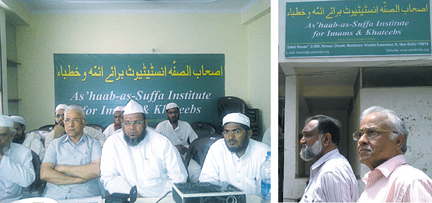Suffa Institute for Imams and Khateebs
An Institute to turn the Friday sermons in to effective tool of communication on contemporary issues gets going in Delhi.
By Abdul Bari Masoud
New Delhi: At a time when run-of-the-mill madrassas have been mushrooming in every corner of the country, a unique initiative has been launched here to train the imams and madrassa graduates in delivering more meaningful sermons at Friday congregations. The Institute named, Ashaabus Suffa Institute for Imams and Khateebs has been set up by the NGO, Zakat Foundation of India for imams and khateebs in Delhi. The institute pursues the objective to reinvigorate the Friday sermons as an effective means of communication among Muslims as Jumaa congregations fetch nearly 30 per cent of the members of the community to the mosque. The Institute tries to impart, train and enrich the knowledge of imams who can deliver comprehensive sermons endowed with substantial input from the context. It has so far trained more than a hundred imams, mostly from Uttar Pradesh, Bihar and Rajasthan.
Explaining the idea behind the initiative to the Islamic Voice, Prof. Imtiyazuddin Ahmad Siddqui, director of the Institute, says imams generally deliver Jumaa sermons in Arabic, hence the entire content bypasses the ken of the ordinary Muslims who have no touch with the language. These sermons are meant to regenerate the spirit of Islam among the believers and urge them to do pious deeds and throw light over contemporary issues that afflict the community. He says most mosques across the country use the khutbas written by Maulana Asharf Ali Thanvi which contain a lot of glorification of God, some Qu’ranic verses and Hadiths, but in the present context, these are of little use. He insists that the sermons delivered by the Prophet (pubh) and his companions were not confined to praise of the Lord, but elucidated the issues and elaborated the action desired by the faithful on issues of day-to-day life. These expounded high ethical values, good deeds, preemption of evil, obligations of individual as well as society. “Therefore, khutbas could be used to guide the community in the right direction”, Imtyazuddin adds.
Referring to the khutbaats delivered in Makkah and Madinah, he said these are surely in Arabic language, but based on well- researched topics of significance for societal upgradation. “It is vital that, in India the messages given through Arabic Sermons are adequately and periodically explained to the congregation during the Friday speech delivered in local language”, he added.
Though the Institute used to have a 3-day training schedule every month, the duration has been reduced to merely two days. The schedule is announced in newspapers and the participants are paid conveyance and provided the boarding and lodging facilities. He points out the course has been prepared in consultation with noted Islamic scholars which consists of topics such as purpose of human creation, basic concepts of Islam, lessons from the Prophet’s life (pbuh), events in the lives of various prophets, Awqaaf (importance of voluntary action by the civil society) and government welfare schemes for Muslims, Right to Information Act, how to enroll for Aadhar card, participation in Democratic process (registration as voters, voting etc). He says the canvas would be broadened as the time passes and may included larger issues such as human rights include violation etc.
Asked if the initiative is facing any resistance or opposition from any quarter, Siddiqui says it has generated very favourable response as the Institute does not get into any sectarian (maslaki) issues and stances and concentrates on issues that have implications for the day to day life of a Muslim. “Usually, when an imam contacts us, his first question would be about ‘maslak’, and feels enthused when the reply is in negative.
On future plans, he said the institute has limited resources as it is helped by a few philanthropists who feel the urge to turn the Friday sermons into an effective means of communication. He says, despite the financial constrains, the Institute has planned a mega training programme at Kandla in Muzaffarnagar district of Uttar Pradesh in September where 300 imams will attend the programme. “Another one will be held in Jaipur next month”, he adds.
For more information contact: Prof. Imtiyazuddin Siddiqui, Ashaabus Suffa Institute, Madanpur Khadar, Extension 3, New Delhi, Ph: 9818624930.


COMMENTS